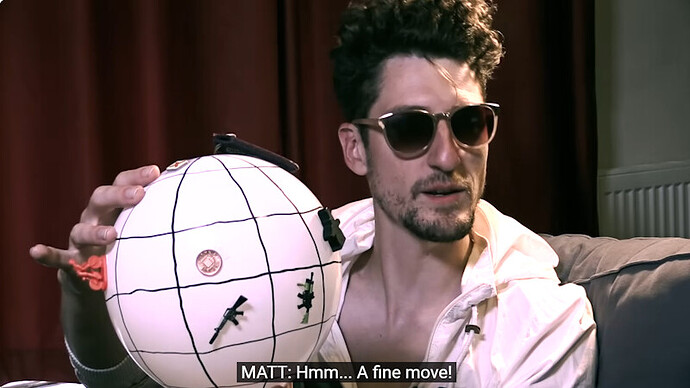So, I’ve been reminded of this sort of thing by watching some episodes of Bluey, lately. I can elaborate on that if necessary.
So, what creates a “high” moment in gaming? Needing to roll 12 on 2d6 and doing it? Yes, I guess. For some people, that’s the pinnacle of a gaming achievement. Certainly you can imagine people leaping to their feet and throwing their arms in the air with amazement at such a feat. But, in my mind, a better “high” is when a player tactfully noted and then exploited a gamestate or another player’s misstep. And in these cases, it’s probably not a leaping-to-your-feet-arms-in-the-air wild celebration; in many cases, it’s a:
In older designs, there were more “a-ha, gotcha” moments; yes, one of the cornerstones of the “German/Euro-style” game was that there was not head-to-head adversarial competition – but that’s not to say there weren’t sharp edges on which to snag; or sharp elbows to throw and snag your opponent at the opportune moment.
There’s a survivorship bias, certainly, but looking at the games from 1995-2005 I see a better dichotomy between “Euro” and “Ameritrash”
Top 45 Games on BGG published between 1995 and 2005
45 because that’s how many I could grab with a copy/paste between a couple of sets of banner ads.
| BGG Rank |
Game |
| 13 |
Twilight Struggle (2005) |
| 42 |
Puerto Rico (2002) |
| 60 |
Power Grid (2004) |
| 92 |
El Grande (1995) |
| 100 |
Caylus (2005) |
| 104 |
Tigris & Euphrates (1997) |
| 109 |
Twilight Imperium: Third Edition (2005) |
| 119 |
Age of Steam (2002) |
| 148 |
Ra (1999) |
| 152 |
Ticket to Ride: Europe (2005) |
| 171 |
War of the Ring (2004) |
| 176 |
Memoir '44 (2004) |
| 182 |
Railways of the World (2005) |
| 212 |
Carcassonne (2000) |
| 223 |
Paths of Glory (1999) |
| 226 |
YINSH (2003) |
| 228 |
Ticket to Ride (2004) |
| 243 |
The Princes of Florence (2000) |
| 250 |
Goa: A New Expedition (2004) |
| 255 |
Glory to Rome (2005) |
| 262 |
Samurai (1998) |
| 280 |
Battle Line (2000) |
| 288 |
Hive (2000) |
| 291 |
Indonesia (2005) |
| 321 |
Tikal (1999) |
| 327 |
For Sale (1997) |
| 329 |
Lost Cities (1999) |
| 330 |
Antiquity (2004) |
| 351 |
Chinatown (1999) |
| 366 |
Hannibal: Rome vs. Carthage (1996) |
| 377 |
San Juan (2004) |
| 395 |
Saint Petersburg (2004) |
| 399 |
Schotten Totten (1999) |
| 412 |
Arkham Horror (2005) |
| 458 |
Lord of the Rings: The Confrontation (2005) |
| 460 |
Heroscape Master Set: Rise of the Valkyrie (2004) |
| 465 |
PitchCar (1995) |
| 477 |
Amun-Re (2003) |
| 488 |
No Thanks! (2004) |
| 491 |
Citadels (2000) |
| 500 |
Shadows over Camelot (2005) |
| 503 |
Descent: Journeys in the Dark (2005) |
| 506 |
Blood Bowl: Living Rulebook (2004) |
| 517 |
Bohnanza (1997) |
| 523 |
1846: The Race for the Midwest (2005) |
EDIT: used a logged-out browser to pull the 1995-2005 games to avoid BGG attributing version Years with the first-published years.
We could pick apart this list and find things that meet any number of criteria. But something I’ve noticed in these older titles, among other things, is that there are stakes at risk when playing these games. These are games that you can lose on the first or second turn.
But how has that changed?
I tend to ignore a lot of modern “euro” games for a number of reasons, so I will pick on one that I actually played: Carnegie.
I don’t think you can lose Carnegie on a “bad turn”. Each turn, you do some things and you get a non-zero, positive number of victory points as a result; maybe not immediately, but eventually they’ll materialize.
This is the gentrification of euro-games I was alluding to previously.
Maybe the Agricola vs Caverna discussion is the most apt. In Agricola, the competition for worker spaces is vital and brutal. In Caverna (and more recent Rosenberg titles), sure, it might be a little inconvenient, but there’s another space that you can use. And yes, there are specific micro-game-states where quasi-equivalent worker spaces aren’t actually fungible, but overall it’s a kinder, gentler Euro design sphere we see today compared to 20 years ago.
